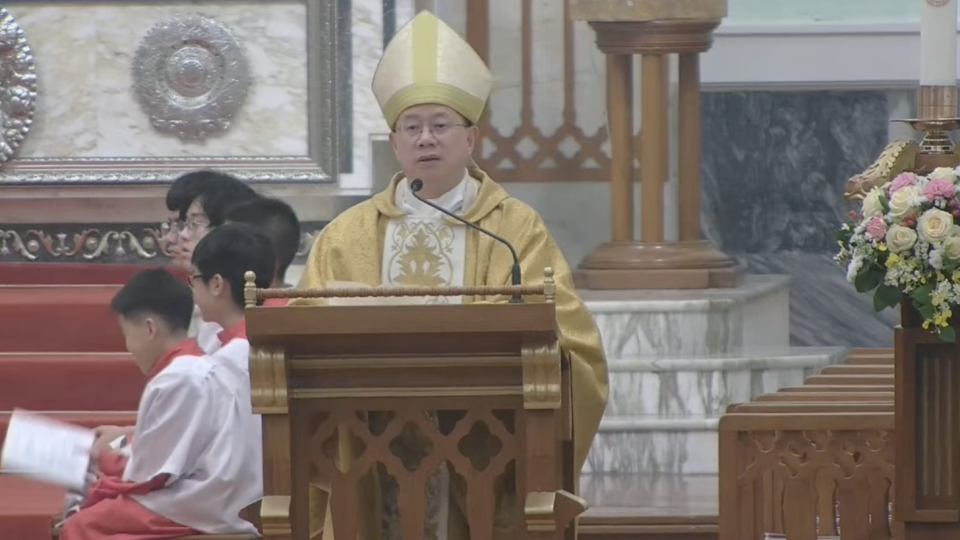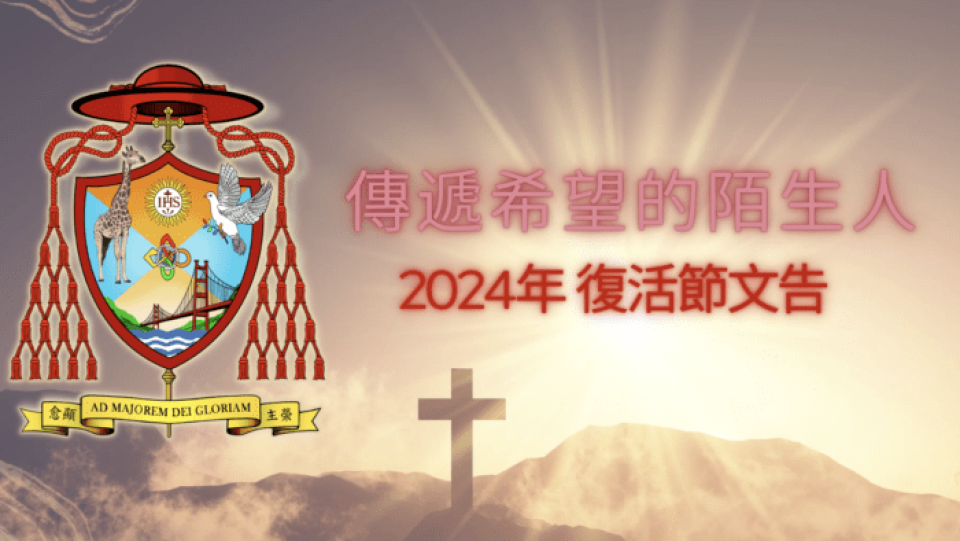
圖片:澳門教區社會傳播中心
2024年復活節文告
復活的主,請教給我們祈禱
各位親愛的兄弟姊妹:
阿肋路亞!
基督的復活,令我們的信仰成為真實的(參閱格前15:14)。每當我們重新宣認這份信仰時,透過領受各種聖事,我們參與祂的死亡與復活(參閱羅6:5-8;若6:54)。但只是相信和宣認這份信德並不足夠,還需要透過祈禱,與天主建立關係。
為準備2025年的禧年,教宗方濟各欽定本年為「祈禱年」,並透過宗座福音傳播部出版《祈禱年輔助材料》,鼓勵信友們虔誠地活出祈禱生活。祈禱年是一份邀請,去與天主進一步建立關係,更是一個機遇去讓我們反思我們的信仰的質素。
在我們每天的生活中,在面對不同的處境,無論順逆,即使多繁忙,都要騰出祈禱的時間。「祈禱是讓天主在我們內心工作的方式,即使在最困難的情況下,也能明白天主想向我們傳遞甚麼訊息,祈禱是為了獲得繼續前進的力量。」(教宗方濟各,2022年1月9日《三鐘經》)
「主,請教給我們祈禱。」(路11:1)門徒們這個請求,反映出他們自己的不足,甚至渴求祈禱時所需的實際方法。祈禱不只是一個虔敬的習慣,而是「靈魂的呼吸」,而「呼吸」更是人類最基本的需求。(參閱教宗方濟各,2021年6月9日公開接見活動)每次的祈禱,都是與天主深入交融的機會,也是一個機會去聆聽天主對我們說話。
祈禱是唯一能觸及我們內在真理的途徑。當我們進入我們的內心,我們便找到天主的光;而這道光,將延伸到我們的生活中,從而活出天主的臨在。祈禱有如指南針般,指引我們(參閱《祈禱年輔助材料》);又如船錨般,避免我們被狂風巨浪吹走。
當我們恆常地祈禱,就是滋養着我們的生命,也能時刻活出天主的臨在。祈禱需要鍥而不捨,因為只有持之以恆的祈禱、只有熱愛祈禱的靈魂,才能轉化一個人的內心,繼而轉化團體、社會,以至整個世界。
響應教宗方濟各的呼籲,為迎接禧年,我邀請教區內各成員,促進個人祈禱和團體祈禱的中心地位。首先重溫教宗方濟各過去數年公開接見活動以「祈禱」為題的教導,透過默想走進祈禱的學堂。
堂區團體的祈禱。在堂區團體的層面,特別著重每次彌撒聖祭的每個細節,因為「教友們參與聖體祭……整個基督徒生活的泉源與高峰」(《教會》教義憲章,11);又或在堂區內組織「時辰頌禱」、朝拜聖體、團體修和禮等祈禱聚會,讓堂區內每一位成員,明暸並參與教會公共的祈禱生活。
家庭中的祈禱。家庭是祈禱的學校,亦是孕育子女祈禱的首個地方;亦只有透過家庭的牧靈工作,使家庭成為家庭教會,並在社會中作福音的酵母。(參閱《愛的喜樂》宗座勸諭,290)「一家人生活的空間可成為『家庭教會』,作為舉行感恩祭的場地,讓基督臨在,同坐一席……到這個家瀰漫著天主的臨在,家人一同祈禱,恩澤滿盈。」(《愛的喜樂》宗座勸諭,15)
青年人的祈禱。至於青年人在生活上,總會感到迷惘,以及遇到不少波折;我們更需要與青年同行,與他們一同發掘祈禱中所獲得的安慰。「青年在這裡經驗友誼和墜入愛河,也在這裡認識自我,一起分享音樂,參加娛樂活動和體育運動,甚至反省和祈禱。」(《生活的基督》宗座勸諭,218)
退省的祈禱。「耶穌就起身出去,到荒野的地方,在那裡祈禱。」(谷1:35)聖史的記載讓我們看到兩個必要的幅度:一)以一種非恆常的方式,與天主聖父進行個人對話的必要性;二)以一顆寧靜的心,細聽天主的聲音及發現天主的旨意。在祈禱年的機遇上,神修退省能給予一個機會,以一顆更新的內心去皈依。(參閱《祈禱年輔助材料》)
祈禱的教理。作為福傳過程中的一個關鍵步驟,教理能有助信仰的成長與成熟,並有着教育祈禱和祈禱中教育的任務,發展基督徒經驗的默觀層面。透過推廣教理的培育,讓信友理解祈禱的深意,從而活出祈禱的精神。
讓我們在「祈禱年」中,重新發現祈禱的中心地位,並培養成為祈禱的生命、祈禱的靈魂,從而擴展至日後的生活,均能透過祈禱,與天主更接近。願我們又仰賴天上慈母的助佑,像她一樣保持一顆誠懇及謙卑的心祈禱,成為希望的朝聖者,邁向禧年。
+李斌生主教
天主教澳門教區
2024 Easter Message
Risen Lord, teach us to pray
Dear brethren,
Alleluia!
Christ’s resurrection makes our faith real (cf 1 Cor 15:14). Whenever we profess this faith anew, we participate in His death and resurrection, through the reception of the Sacraments (cf Rom 6:5-8; Jn 6:54). But it is never enough just to believe and profess this faith; it is necessary to establish a relationship with God, through the means of prayers.
In preparation for the Jubilee Year, Pope Francis has designated this year as the “Year of Prayer”, and through the Discastery for Evangelization, has published a guidebook to encourage the faithful to live out their lives of prayer faithfully. The Year of Prayer is an invitation to grow in our relationship with God, and an opportunity to reflect on the UN quality of our faith.
In our every day’s life, we may face different situations, either good or bad, or even in our busiest schedule, we must make time for prayer. “To pray is the way to let God act within us, to understand what he wants to communicate to us even in the most difficult situations, to pray to have the strength to go forward.” (Pope Francis, Angelus, 9 January 2023)
“Lord, teach us to pray!” (Luke 11:1) This request and pledge of the disciples certainly reflects an awareness of their inadequacy, and of the need for even practical guidance on how to pray. Prayer is not just a devotional habit, but a spiritual “breath of life”, where “breathing” is the most basic human need (cf Pope Francis, Wednesday Audience, 9 June 2021). Every time we pray, it is an opportunity for a deeper communion with God, as well as an opportunity to listen to God’s words towards us.
Prayer is the way to get in touch with our deepest truth, where God’s own light is present; and this light will extend into our lives, so that we can live out the Presence of God. Prayer is like a compass that guides (cf Handbook for the Year of Prayer, “Teach us to pray”), and an anchor that prevents us from being strayed by the winds and waves.
Regular and constant prayer nourishes our daily lives, and helps us to live out the Presence of God at all times. Prayer requires perseverance, since when a soul loves and is persistent in prayer, the heart can be transformed and converted, and hence transforming others: our community, our society, and even the whole world.
In response to Pope Francis, I invite all members in the Diocese to promote the centrality of individual and community prayer, in order to prepare for the Jubilee Year. The first step is to revisit the teaching of Pope Francis on the theme of “Prayer” from his Wednesday Audiences in the past few years, and to enter the school of prayer through meditation.
PRAYER IN THE PARISH COMMUNITY. At the level of the parish community, we should be mindful of every detail of the Holy Sacrifice of the Mass, because “taking part in the Eucharistic sacrifice..is the fount and apex of the whole Christian life” (Lumen Gentium, 11); we may organize different prayer meetings such as the Liturgy of the Hours, Eucharistic Adoration, Reconciliation etc, allowing every member within the parish to understand and participate in the public prayer life of the Church.
PRAYER IN THE FAMILY. The family is a school of prayer, and is the first place to nurture children’s life of prayer; only through the pastoral care for families can we enable them to be both domestic churches and a leaven of evangelization in society (cf Amoris Laetitia, 290). A family’s living space could turn into a domestic church, a setting for the Eucharist, the presence of Christ seated at its table…Here we see a home filled with the presence of God, common prayer and every blessing.” (AL 15)
YOUNG PEOPLE’S PRAYER. Young people are often confused and may encounter numerous ups and downs in their lives, it is more important to accompany them and discover with them that comfort originates from prayer. “Young men and women can meet one another, where they can share music, games, sports, but also reflection and prayer.” (Christus Vivit, 218)
RETREATS ON PRAYER. “[Jesus] went out to a deserted place, and there he prayed.” (Mk 1:35) The Evangelist gives us an image of Jesus that points to two essential dimensions of Christian prayer: 1) removing oneself from the daily routine – necessary for seeking personal dialogue with the Father – and 2) a silent heart – indispensable for listening for God’s voice and hearing what He wants. In this perspective and in the context of the Year of Prayer, a spiritual retreat can provide an unparalleled opportunity for spiritual conversion and a renewal of heart (cf Handbook for the Year of Prayer, “Teach us to pray”).
CATECHESIS ON PRAYER. As a key step in the process of evangelization, of promoting growth and maturation in the faith, Catechesis has the task of educating for prayer and in prayer, developing the contemplative dimension of Christians. Through catechetical formation , the faithful can understand the deeper meaning of prayer and thus live out the spirit of prayer.
In this Year of Prayer, let us rediscover the centrality of prayer and cultivate a life of prayer and a soul of prayer, which will extend to our future lives and bring us closer to God. May we also rely on our heavenly Mother, and imitate her to maintain a sincere and humble heart to pray, in order to become Pilgrims of Hope towards the Jubilee Year.
+Bishop Stephen Lee Bun Sang
Catholic Diocese of Macau

